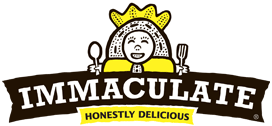FAQ
What’s the shelf life?
- When stored in a refrigerator, an unopened package of dough will remain fresh until the expiration date printed on the package
Where can I find the expiration date?
- For cookies, the expiration date is printed on the back of the package under the flap.
- For canned dough, the expiration date is printed on one of the metal ends of the can.
- For baking mixes, the expiration date is printed on the top of the box.
- Pie crust, the expiration date is printed on the end of the box.
- If you contact us about something, providing the expiration date and the UPC code will help us answer your questions or concerns.
What if I only use half a package, can I freeze the dough?
- Our COOKIE DOUGH products can be frozen for up to 2 months.
- Once a package is opened, you should store the remaining dough in a food storage container for two weeks. This will help keep the dough from drying out.
- Our biscuits crescent and cinnamon rolls are in pressurized cans, you should NOT freeze them.
- However, if you open the container and have unbaked leftovers, you can freeze them in a sealed bag for up to two weeks.
- Before preparing them, defrost the frozen dough so they bake properly. It’s best to thaw frozen dough in your refrigerator, it takes a while but you get the best results.
- Pie crusts can be frozen for up to two months if placed in the freezer before the expiration date, but be sure to bring it to room temperature before working with the crust. For best results, thaw overnight in your refrigerator.
What are the ideal conditions for baking cookies?
- Preheat the oven. Make sure the temperature is accurate; every oven is a little different.
- Place the sheet on the middle rack. If you use cookies directly from the freezer, let them thaw slightly.
- Keep an eye on baking cookies. Ovens are all different, so peek in every now and then!
- We don’t recommend toaster ovens for our products.
Can I eat raw dough?
- NO! REALLY. Do not eat any dough raw. It must be properly cooked before enjoying.
What is trans fat and do you use them?
- Trans fat is a form of fat that should be limited in a healthy diet. Trans fats can be from a natural or man-made origin. Trans fats form when vegetable oils are produced through a process called hydrogenation. These vegetable oils have been popular substitutes for saturated fats which have been linked to raise blood cholesterol levels. Only in recent years have studies emerged showing that the potential health effects of partially hydrogenated/trans fat vegetable oils may be similar to saturated fats.We are proud that our product use 0 grams of trans fat!
What does “MAY CONTAIN MILK” Mean?
- We have the “May Contain Milk” statement in at the end of the ingredient listing on some of our dough products. We want to alert consumers that are concerned about milk that our products may be processed on lines that handle milk ingredients.
Do your products contain peanuts, tree-nuts or traces of either?
- Refer to the ingredient listing if you’re concerned about nuts of any kind. If they are present in the product it will be clearly labeled. Contact us if you need more information.
Why Palm Oil, and what’s the difference between palm fruit oil and palm kernel oil?
- We use Palm Fruit Oil … NOT Palm Kernel oil. Both oils come from palm trees, but that is where the similarity ends. Palm Fruit oil comes from the fleshy part of the fruit and contains the “good monounsaturated fats”. Palm Kernel oil comes from the nut and predominantly consists of saturated fats.
What’s unbleached / unbromated flour?
- Bleaching is a common practice done to produce a consistently white product. Potassium bromate is used to treat flour to improve baking quality. At Immaculate Baking, we realize that neither bleaching nor the use of potassium bromate in flour is necessary for – or desirable- to make great baked good products.
